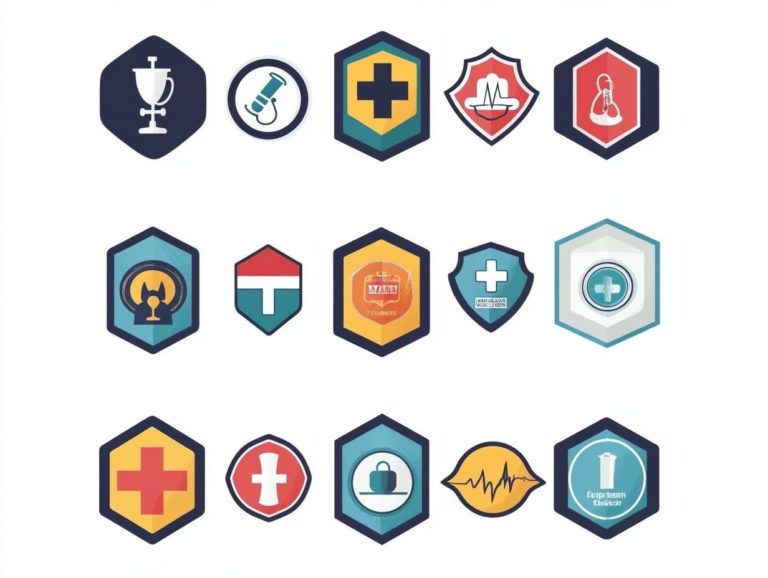5 Reasons to Get Certified in Healthcare Quality
In today s constantly shifting healthcare landscape, you re likely looking for ways to elevate your career while ensuring top-notch patient care.
Certification in healthcare quality is a powerful way to help you achieve these aspirations.
Let s explore five exciting reasons why you should pursue this certification right now highlighting advancement opportunities, job security, and increased earning potential.
You ll also discover the essentials of healthcare quality certification, including the requirements, various types, and effective tips for exam preparation.
Dive in to discover how obtaining this certification can transform your career and bring substantial benefits to healthcare organizations!
Contents
- Key Takeaways:
- 1. Advancement Opportunities
- 2. Increased Job Security
- 3. Enhanced Knowledge and Skills
- 4. Competitive Edge in the Job Market
- 5. Higher Earning Potential
- What Is Healthcare Quality Certification?
- Frequently Asked Questions
- Unlock Your Potential: Why Healthcare Quality Certification Matters!
- What Are the Specific Benefits of Getting Certified in Healthcare Quality?
- Are There Different Types of Certifications Available for Healthcare Quality?
- How Do I Become Certified in Healthcare Quality?
- Is the Certification Valid for a Certain Period of Time?
- Who Should Consider Getting Certified in Healthcare Quality?
Key Takeaways:

Unlock greater career opportunities with healthcare quality certification. It allows individuals to pursue higher positions and more challenging roles in the field, as highlighted in 5 ways certification enhances healthcare careers.
Certification provides increased job security, demonstrating a commitment to professionalism and ongoing education in the constantly evolving healthcare industry.
It also enhances your knowledge and skills, keeping you up-to-date with the latest best practices and techniques in healthcare quality.
1. Advancement Opportunities
Advancement opportunities in the healthcare sector significantly expand when you obtain the Certified Professional in Healthcare Quality (CPHQ) certification. This credential not only elevates your credibility among healthcare professionals but also unlocks numerous roles centered on healthcare quality, patient safety, and risk management.
By earning this certification, you demonstrate your commitment to continuous improvement and performance enhancement within healthcare organizations.
With this credential in hand, you can explore various career paths, such as:
- Quality improvement manager
- Patient safety officer
- Compliance analyst
Each of these roles requires a deep understanding of risk management principles and underscores the importance of implementing evidence-based practices to elevate patient care.
The knowledge you gain through the CPHQ certification fosters your professional development, allowing you to sharpen your analytical skills and embrace innovative strategies for quality assurance.
As you advance in your career, you ll likely find yourself better equipped to lead teams, craft impactful policies, and contribute meaningfully to a culture of safety and excellence within your organization.
2. Increased Job Security
Increased job security is one of the standout benefits of obtaining the CPHQ certification. As healthcare certifications become more recognized and valued, employers are actively seeking qualified professionals who meet accreditation standards.
In today s fast-paced healthcare environment, organizations place a premium on hiring certified individuals who are not just familiar with best practices but are also adept at implementing quality improvement strategies.
As the emphasis on patient care and safety sharpens, holding a certification like CPHQ not only boosts your employability but also gives you a competitive edge during hiring processes.
Employers tend to favor candidates who demonstrate a commitment to ongoing professional development, signaling their ability to navigate the ever-changing landscape of regulations and industry standards.
Therefore, certifications play a crucial role in enhancing job stability and unlocking advanced career opportunities, underscoring the importance of qualifications in the healthcare sector.
3. Enhanced Knowledge and Skills
The CPHQ certification not only elevates your medical knowledge but also arms you with a robust skill set essential for driving healthcare improvement and ensuring patient safety.
By engaging in targeted training programs, you deepen your understanding of crucial areas such as risk management and performance improvement. These focus areas empower you to identify potential hazards and streamline processes, ultimately leading to improved patient outcomes.
The emphasis on data analysis and quality measurement creates an environment where informed decisions can flourish, further enhancing the standard of care you provide.
As you become more adept in these domains, you’ll find yourself better equipped to implement innovative practices that significantly contribute to overall patient wellbeing and safety.
4. Competitive Edge in the Job Market

A CPHQ certification gives you an edge in the job market. It shows you understand healthcare quality and accreditation standards.
This certification reflects your commitment to excellence. It enhances your visibility among employers and peers.
By validating your expertise, you can confidently tackle healthcare challenges. Employers see your dedication to improving patient outcomes.
As healthcare focuses on quality, obtaining this certification can enhance your professional profile, making you a sought-after asset in a competitive field. Here are 5 reasons to get certified in project management.
5. Higher Earning Potential
Achieving a CPHQ certification can significantly enhance your earning potential. Many healthcare organizations recognize the value of qualified professionals and are willing to offer premium compensation.
This trend mirrors a broader movement in the industry. Enhanced qualifications are now essential for navigating patient care and operational efficiency.
As the shift towards value-based care models gains momentum, certified professionals boost their career prospects. They align themselves with market demands emphasizing quality and accountability.
In a competitive landscape, those who invest in education and certifications find themselves at an advantage. This investment leads to job security and greater opportunities for advancement.
What Is Healthcare Quality Certification?
Healthcare quality certification, like the CPHQ, formally recognizes your understanding of healthcare quality principles, patient safety, and risk management. This certification is vital for healthcare organizations seeking to comply with accreditation standards.
By obtaining such certifications, you showcase your dedication to professional growth. You also highlight your organization’s commitment to delivering high-quality care.
Adhering to established practices cultivates a trustworthy reputation. This credibility instills confidence among patients and stakeholders.
The pursuit of certification encourages ongoing education and the adoption of best practices. This proactive approach enhances patient outcomes and operational effectiveness.
What Are the Requirements for Certification?
The requirements for healthcare quality certification, especially the CPHQ exam, include relevant work experience, educational credentials, and a solid understanding of healthcare standards.
To apply, you generally need at least two years of work experience in healthcare quality or a related field. A bachelor s degree in a healthcare-related discipline is often preferred.
Familiarity with regulatory guidelines and quality improvement methodologies can elevate your chances of success. Engaging with professional networks will keep you informed about evolving practices in healthcare.
How Can Certification Benefit Healthcare Organizations?

Certification benefits healthcare organizations by ensuring that their professionals are fully equipped with the essential knowledge and skills to uphold the highest standards of healthcare quality and meet stringent accreditation requirements.
This robust framework not only enhances clinical skills but also significantly improves patient outcomes. When you follow the 7 steps to achieving your healthcare certification, you gain a deeper understanding of quality management principles, allowing you to adopt a proactive stance in identifying and mitigating risks.
Your expertise fosters a culture of continuous improvement, empowering your team members to engage in best practices and drive organizational performance.
By aligning your efforts with recognized industry standards, you contribute to establishing a dynamic environment where safety and quality take precedence, ultimately transforming healthcare settings into more efficient and patient-centered facilities.
What Are the Different Types of Healthcare Quality Certifications?
You ll find a range of healthcare quality certifications available, such as CPHQ and NAHQ, each designed to cater to the diverse needs of healthcare professionals seeking to elevate their expertise in various facets of healthcare delivery.
These certifications act as both a benchmark and a source of motivation for individuals in different roles within the industry. Take the Certified Professional in Healthcare Quality (CPHQ), for example; it emphasizes quality assurance and patient safety, specifically benefiting those in management or quality improvement positions.
Certifications like the Nursing Assistant Certification (NAC) focus on essential patient care skills, which directly enhances the effectiveness of frontline staff.
Each certification establishes a standardized level of knowledge and encourages continuous professional development crucial in the ever-evolving landscape of healthcare.
How Can One Prepare for Certification Exams?
Preparing for certification exams like the CPHQ demands a strategic approach. You ll want to familiarize yourself with the exam format, study relevant materials, and engage in consistent practice to ensure a thorough understanding of healthcare quality principles.
To set yourself up for success, create a comprehensive study plan that allocates specific time blocks for reviewing critical topics and completing study guides aligned with the exam’s content areas.
Utilizing practice tests is invaluable; they help you gauge your readiness and spotlight areas that might require a bit more attention.
Exploring various resources such as online forums, webinars, and peer study groups will foster a supportive learning environment.
A solid grasp of key concepts in healthcare improvement and risk management is essential, as these form the foundation of effective quality assurance practices within healthcare settings.
What Are the Continuing Education Requirements for Maintaining Certification?
Continuing education requirements for maintaining certifications like CPHQ are crucial for you to stay abreast of the latest trends, knowledge, and standards in healthcare quality and patient care.
These credits show your dedication to staying updated and emphasize that healthcare is an ever-evolving field. You have various avenues to fulfill these requirements, such as:
- Engaging in interactive workshops that foster hands-on skills.
- Attending insightful conferences that offer networking opportunities and the chance to learn from industry leaders.
- Participating in accessible online courses tailored to diverse learning styles.
When you actively pursue these exciting educational opportunities, you enhance your competence and contribute to improved patient outcomes and organizational success, underscoring the vital importance of lifelong learning in the healthcare sector.
Frequently Asked Questions

Unlock Your Potential: Why Healthcare Quality Certification Matters!
Getting certified in healthcare quality provides essential knowledge and skills to enhance care quality in healthcare settings. Additionally, pursuing a healthcare informatics certification shows your commitment to the field and can lead to exciting career advancement opportunities.
What Are the Specific Benefits of Getting Certified in Healthcare Quality?
Getting certified in healthcare quality opens many doors:
- Better job opportunities
- Higher salary potential
- Enhanced credibility and recognition
- Access to a professional network
- The ability to contribute effectively to quality improvement in healthcare organizations
Are There Different Types of Certifications Available for Healthcare Quality?
Yes! There are various certifications available, such as:
- Certified Professional in Healthcare Quality (CPHQ)
- Certified Professional in Patient Safety (CPPS)
- Certified Manager of Quality/Organizational Excellence (CMQ/OE)
Each certification has unique requirements and focuses on different aspects of healthcare quality.
How Do I Become Certified in Healthcare Quality?
To achieve certification in healthcare quality, you’ll generally need to meet certain education and experience requirements. This includes passing a certification exam and committing to ongoing education. It’s crucial to research the specific requirements for each certification you re interested in.
Is the Certification Valid for a Certain Period of Time?
Most healthcare quality certifications are valid for 2-3 years. After this period, you’ll need to complete recertification requirements to keep your certification. This may involve taking continuing education courses or retaking the certification exam.
Who Should Consider Getting Certified in Healthcare Quality?
Anyone working in healthcare quality can benefit from this certification. This includes quality managers, nurses, doctors, administrators, and other healthcare professionals. It’s also a great step for those looking to enter or advance their career in healthcare quality certification. Don’t miss out on the chance to elevate your career!






